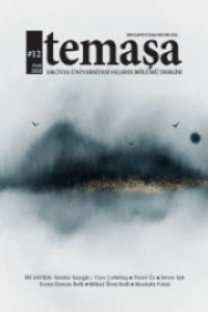Patikalardan Otobanlara Hız Kültürü Karşısında Yavaşlamanın İmkanı Üzerine Bir Soruşturma
An Investigation On The Possibility Of Slowing From Pathes To Motorways Against Speed Culture
Path, Highway, Speed Culture, Slowness, Reality,
___
- Adorno, T. Minima Moralia (6. Baskı). Çeviren: Orhan Koçak ve Ahmet Doğukan, İstanbul: Metis Yayınları, 2009.
- Adorno, T. ve Horkheimer, M. Aydınlanmanın Diyalektiği. Çeviren: Nihat Ülner ve Elif Ö. Karadoğan, İstanbul: Kabalcı Yayınevi, 2010.
- Amato, J. A. On Foot: A History of Walking. New York: New York University Press, 2004.
- Benjamin, W. Pasajlar (9. Baskı). Çeviren: Ahmet Cemal, İstanbul: Yapı Kredi Yayınları, 2012.
- Breton, D. L. Yürümeye Övgü (5. Baskı). Çeviren: İsmail Yerguz, İstanbul: Sel Yayıncılık, 2019.
- Claxton, G. Hare Brain, Tortoise Mind: How Intelligence Increases When You Think Less. New York: Harper Collins Publishers, 1999.
- Crawford, M. B. Why We Drive. New York: Harper Collins Publishers, 2020.
- DeSilva, J. First Step. New York: Harper Collins Publishers, 2021.
- Droit, R. P. Filozoflar Nasıl Yürür?. Çeviren: Yavuz Baran, İstanbul: Hep Kitap, 2017.
- Gros, F. Yürümenin Felsefesi (8. Baskı). Çeviren: Albina Ulutaşlı, İstanbul: Kolektif Kitap, 2018.
- Heidegger, M. Discourse on Thinking. Translator: John M. Anderson and E. Hans Freund, New York: Harper Torchbooks, 1969.
- Heidegger, M. Düşünmek Ne Demektir? (2. Baskı). Çeviren: Rıdvan Şentürk, İstanbul: Paradigma Yayınları, 2013.
- Honoré, C. Yavaş. Çeviren: Esen Gür, İstanbul: Alfa Yayınları, 2008.
- Kuuliala, J. and J. Rantala. “Introduction: Travelling, Religion, And Society From Antiquity to The Middle Ages” in Travel, Pilgrimage and Social Interaction From Antiquity to The Middle Ages, Editors: Jenni Kuuliala and Jussi Rantala, 1-14. New York: Routledge, 2020.
- Lefebvre, H. Kentsel Devrim. Çeviren: Selim Seze, İstanbul: Sel Yayıncılık, 2013.
- Meiers, F. “The Wagon Rests in Winter, The Sleigh in Summer, The Horse Never: Practices of İnterurban Travelling On Horseback From Antiquity to The Middle Ages” in Travel, Pilgrimage and Social Interaction From Antiquity to The Middle Ages, Editors: Jenni Kuuliala and Jussi Rantala, 248-269. New York: Routledge, 2020.
- Moor, R. Patikalar Üzerine. Çeviren: Burcu Halaç, İstanbul: Kolektif Kitap, 2018.
- Mouratidis, A. and F. Kehagia. “On the Track of Road Evolution,” Journal of Infrastructure Development 6, sayı: 1 (2014): 1-15.
- Panait, V. “New Philosophy is Actually Old Philosophy: Slow Philosophy as a Preoccupation Towards Love of Wisdom,” Meta: Research In Hermeneutics, Phenomenology, And Practıcal Phılosophy X, no: 1 (2018): 246-251.
- Perouse, J. F. “Megapolde İnadına Yürümek Ya Da Yeri Tekrar Oluşturmaya Çalışmak” Mekân ve Yer içinde, Editörler: G. Özaydın ve M. Akı, 65-69. İstanbul: Yeni İnsan Yayınevi, 2021.
- Platon, Devlet (3. Baskı). Çeviren: Sabahattin Eyuboğlu ve M. Ali Cimcoz, İstanbul: İş Bankası Kültür Yayınları, 2001.
- Postman, N. Technopoly. New York: Vintage Books, 1993.
- Ross, G. “The Story of The Road,” Civil Engineering (SAICE) Erişim 20 Kasım 2022. https://www.researchgate.net/publication/202173882_The_story_of_the_road
- Sen, J. “On Slowness in Philosophy,” The Monist 83, no: 4 (2000): 607-615.
- Taburoğlu, Ö. Yavaşlık Felsefesi. Ankara: Doğu Batı Yayınları, 2020.
- Thommen, L. An Environmental History of Ancient Greece and Rome. Translator: Philip Hill, Cambridge: United Kingdom at the University Press, 2012.
- Trante, R. “Could “Slow Philosophy” Offer An Antidote to Modern Academia?,” Erişim 18 Eylül 2022. https://rhystranter.com/2017/10/11/slow-philosophy/
- Walker, M. B. “Why Slow Philosophy is The Antidote to Fast Politics,” Erişim 2 Kasım 2022. https://www.abc.net.au/religion/michelle-boulous-walker-slow-philosophy-in-a-time-of-fast-polit/12336408
- Walker, M. B. Slow Philosophy. Londra: Bloomsbury Publishing, 2017.
- ISSN: 2148-371X
- Yayın Aralığı: 2
- Başlangıç: 2014
- Yayıncı: Prof. Dr. Arslan Topakkaya / Erciyes Üniversitesi Felsefe Bölümü
Ampirist Geleneğin Dil Felsefesine Katkıları
Ferengi “Kazanç Kuralları” ve Niccolò Machiavelli
Tamer AKÇA, Cengiz Mesut TOSUN
Foucault'da İktidarın Ötekileri
Gazzali Descartes'ın Felsefesine Etki Etmiş Midir?
Cezanne’dan Hareketle Merleau-Ponty’nin Fenomenolojisinde Sanatın Önemi
Demokritos'un Euthumiê Anlayışı
Patikalardan Otobanlara Hız Kültürü Karşısında Yavaşlamanın İmkanı Üzerine Bir Soruşturma
İşlevselcilik Qualia'yı Reddeder mi?
Gürsel Korat’ın Çift Aslan Serisinde Unutmanın Sosyolojisi
Saul Aaron Kripke Semantiğinde Özel Adlar ve Gönderim Problemi
